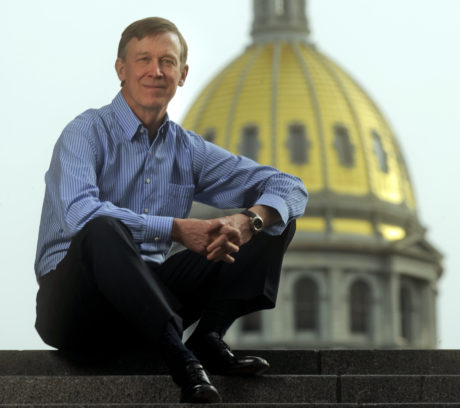Will Colorado’s Next Transportation Ballot Measure Prioritize Transit?

Governor John Hickenlooper and Colorado state legislators will ask voters to fund the state’s transportation system via a ballot measure in November, they announced at the 36 Commuting Solutions legislative breakfast in Broomfield today.
Hickenlooper framed the ballot measure as a roads and transit package, but lawmakers haven’t nailed down specifics.
“We cannot expand capacity, in roads or transit, without the resources to fund it,” he said. “I am very clear on how to squeeze a penny, and get more out of every dollar we spend… but it’s not gonna get us there in terms of the expenditures that we need.”
For Denver, the spending enabled by the ballot measure is likely to be a mixed bag. Some of it would address real needs. The city would get funding to improve walking, biking, and transit infrastructure, as well as for road and bridge maintenance, Colorado DOT Director Shailen Bhatt told Streetsblog.
But new money could also cover projects that would harm Denver, like the $1.7 billion I-70 widening, which currently lacks full funding. Much of the state’s shortfall for genuine needs could probably be covered by scaling back CDOT’s road expansions and focusing on maintenance instead.
The devil will be in the details. Will lawmakers prioritize the transit investments necessary to keep Denver residents moving, or will they ask taxpayers to escalate subsidies for driving and traffic?
Last year, a coalition of metro Denver mayors defeated a bid by the road lobby to block new funding from being spent on transit. That won’t fly in this ballot measure, Hickenlooper said.
“I think transit will have to be there,” he told Streetsblog. “And there will be reasonable discussion between informed adults. The transportation lobby — the asphalt association, the architects, the designers, all those folks — are eager to get something done. And they generally favor roads over transit. There’s also a strong constituency that care deeply about transit — the kind of forward visionaries.”
New funding could come in the form of higher sales or income taxes — even the state gas tax, which hasn’t been raised in a quarter century, is on the table. Getting both rural and urban voters on board will take a compromise, Hickenlooper said. He’ll ask rural voters to realize the statewide economic benefits of transit, and urban voters to heed the agricultural economy’s reliance on roads outside of city centers.
“It is hard for me to understand how we would get a transportation bill passed in the state of Colorado that didn’t have a transit component,” Bhatt said. “If the pie is big enough, then all boats can be floated.”


